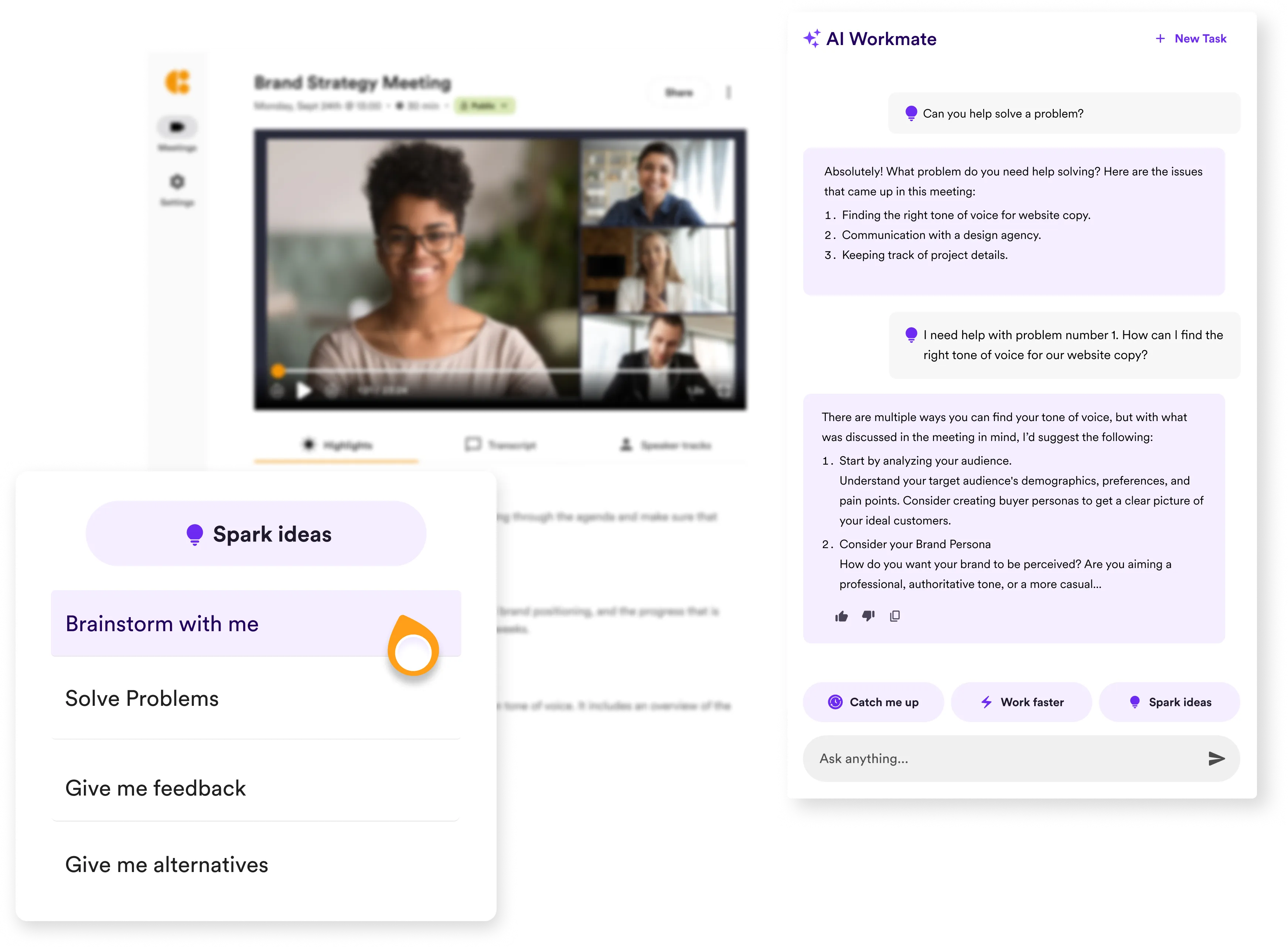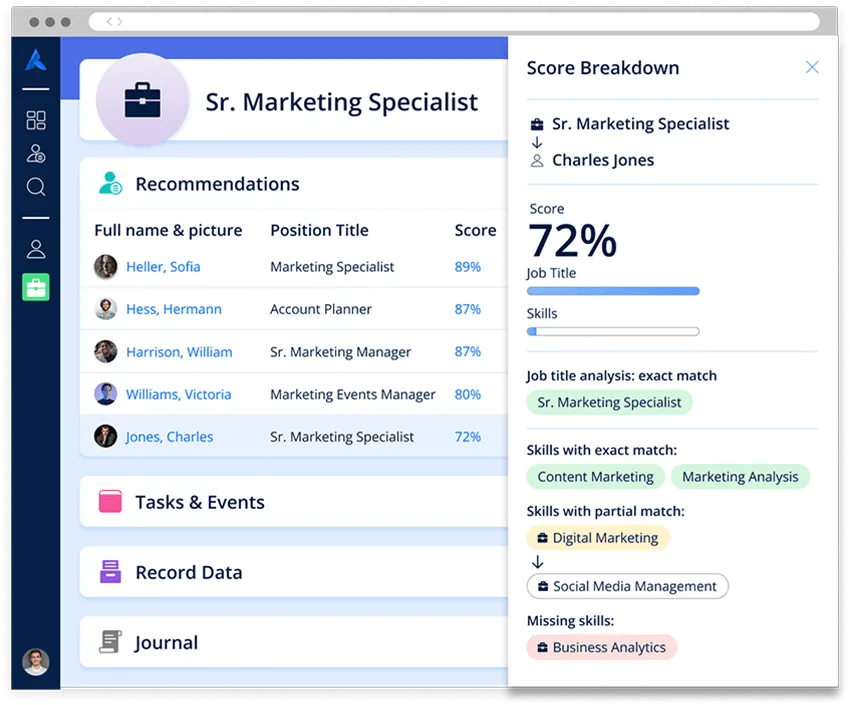What are Interview Metrics and How to Track Them ?

Many recruiters and hiring managers find themselves unsure if their interview process truly identify the best candidates.
And, most of the time, it's because they don't know which metrics to use to assess their interviews' performance and accuracy.
This article will guide through the most critical metrics for evaluating your interviews, covering both interviewee and interviewer performance, but also the top talent acquisition KPIs you should be monitoring.
What Are the Interviewee Metrics to Assess?

Interviewee metrics allow you to evaluate candidates objectively and ensure they are a good fit for the role and your company culture.
Note that -by essence- you cannot measure interviewee metrics without adopting first a structured interview process. Only by streamlining your interview questions and criteria, you can objectively compare candidates between them.
Interviewee metrics are related to :
- Skills and Qualifications: Evaluate both hard and soft skills relevant to the job. Hard skills include technical abilities and knowledge specific to the role, while soft skills cover areas like communication, teamwork, and problem-solving.
- Experience and Education: Assess the candidate’s past job performance, educational background, and certifications. This helps you understand their readiness for the role and the depth of their expertise .
- Cultural Fit: Determine if the candidate aligns with your company values and culture. This is crucial for long-term engagement and employee satisfaction. Use behavioral questions to reveal the candidate’s work style and values.
- Interview Preparedness: Evaluate how well the candidate has prepared for the interview. Check their knowledge about your company, the role, and the industry. A well-prepared candidate demonstrates genuine interest and proactive behavior.
- Communication Skills: Observe clarity, confidence, and coherence in their responses. Effective communication is essential for most roles and can indicate how the candidate will interact with team members and clients.
- Problem-Solving Abilities: Pose situational or behavioral questions to gauge critical thinking and problem-solving skills. Ask about past experiences where they tackled challenges to gain insight into their analytical and decision-making capabilities.
- Adaptability: Assess the candidate's ability to adapt to new situations and challenges. Ask about times they had to learn new skills quickly or adjust to significant changes in their previous roles.
- Emotional Intelligence: Evaluate how the candidate perceives and manages their own emotions and those of others. This can be assessed through questions about conflict resolution and teamwork experiences.
You can track these metrics in three ways :
- Structured Scoring Sheets: Use structured scoring sheets during interviews to rate candidates on the predefined criteria. This ensures consistency and objectivity across different interviewers.
- Applicant Tracking Systems (ATS): Implement an ATS to collect and organize data on candidates from the initial application to the final hiring decision. These systems can generate reports on various metrics, such as interview scores and feedback from different stages.
- Performance Reviews and Feedback: After hiring, track new hires' performance and gather feedback from their managers. Compare this data with their interview scores to evaluate the accuracy and effectiveness of your interview process.
What Are the Interviewer Metrics to Measure?

Besides interviewee, you should also definetely evaluate interviewer performance. Each interviewer need constructive feedback to know if their interview process (list of questions, general attitudes regarding the candidates) helps finding the right candidates. It also helps ensures consistency, fairness, improving the overall candidate experience and quality of your hires.
Here are the interviewer key metrics you should focus on:
- Timeliness: Track whether your interviewers start and finish interviews on time. This includes beginning interviews promptly and providing timely feedback afterward. Delays can disrupt the candidate experience and harm your organization’s reputation.
- Question Quality: Evaluate the relevance and depth of the questions asked. Your interviewers should ask well-prepared, insightful questions that thoroughly assess the candidate’s qualifications and fit for the role. By analyzing the types of questions and their effectiveness in eliciting detailed responses, you can ensure a thorough evaluation of each candidate.
- Engagement and Communication: Assess how well interviewers engage with candidates. Look for eye contact, active listening, and genuine interest in the candidate’s responses. Effective communication helps create a welcoming atmosphere and provides a more accurate assessment of the candidate. Use your scoring sheet to rate these aspects of communication.
- Talk-to-Listen Ratio: Your interviewer should maintain a balanced talk-to-listen ratio, ideally around 40-55%. This balance ensures a productive exchange of information and gives candidates ample opportunity to express themselves. Monitoring this ratio can help improve the overall quality of the interview.
- Interruption Frequency: Monitor how often interviewers interrupt candidates. Frequent interruptions can negatively impact the flow of conversation and the candidate’s ability to convey their thoughts fully. Aim for minimal interruptions to foster a respectful and collaborative interview environment.
- Bias Detection and Normalization: Evaluate any biases interviewers may exhibit, such as preferences for certain skills, gender, or race. Tools like AI-based analysis can help identify and mitigate these biases, promoting a fair and inclusive hiring process. Ensuring unbiased evaluations is critical for diversity and equity in hiring.
How to Track These Metrics?
Which Are the Talent Acquisition KPIs Related to Interview Performance?

As an HR manager, the final metrics you want to focus on are talent acquisition KPIs. These KPIs tells you whether your recruitment decisions really delivers the right outcome in your organization. They enable you to provide valuable feedback to your whole recruitment team and identify areas for improvement to ensure better quality hires.
Here are the ones most closely related to your interviewing process :
Time to Hire: This KPI measures the total time from posting a job vacancy to offer acceptance. A shorter time to hire indicates a streamlined recruitment process, helping you secure top talent quickly before they accept other offers. Monitoring this KPI helps you identify and address delays in the hiring process, ensuring a more efficient workflow. Reducing time to hire keeps candidates engaged and reduces the risk of losing them to competitors.
Interview-to-Offer Ratio: This metric tracks the number of candidates interviewed before an offer is extended. A lower ratio suggests that your screening and initial selection processes are effective, bringing in candidates who are well-suited for the role. This KPI helps you assess the quality of your candidate pool and the efficiency of your interview process. If your ratio is high, it may indicate that your initial screenings are not filtering candidates effectively.
Quality of Hire: Evaluating the performance and retention of new hires over time helps determine if your interviews are identifying the best candidates. This includes new hire performance reviews, feedback from managers, and retention rates. High-quality hires are likely to perform well and stay longer, showing that your interview process accurately identifies candidates who fit well with the role and company culture.
Candidate Experience: Measure candidate experience through surveys and Net Promoter Scores (NPS). This KPI helps you understand and improve the interview process from the candidate’s perspective, ensuring it is smooth, respectful, and engaging.
Diversity and Inclusion: Track the demographic diversity of candidates moving through your interview stages. This ensures your hiring process is inclusive and attracts a diverse talent pool. Regularly analyzing this data helps identify biases and areas for improvement, promoting a fair and equitable recruitment process.
Hiring Manager Satisfaction: Gather feedback from hiring managers on the relevance and effectiveness of the candidates presented. Satisfied hiring managers indicate that the interview process aligns well with job requirements and that recruiters understand their needs. This KPI helps ensure that the recruitment team meets the expectations of hiring managers and delivers quality candidates.
How to track these metrics ?
Measure Objectively the Quality of Your Interviews : Noota

Want to rely on objectively metrics for your interviews ? By leveraging advanced analytics, our interviewing assistant Noota provides valuable insights into both interviewee and interviewer performance :
- Automated Scoring : Noota automates the scoring of candidates based on your predefined criteria specific to your job positions. This ensures consistency and objectivity in evaluating candidates. By using Noota, you can create a standardized scoring system that rates candidates on skills, experience, communication abilities, and cultural fit.
- Conversation Intelligence Metrics : Noota analyzes key conversation metrics such as talk-to-listen ratio, sentiment, and hesitation. The talk-to-listen ratio helps you understand the balance of dialogue during the interview. This can highlight areas where interviewers need to improve their engagement and create a more positive interview experience.
- Performance Insights : Noota provides detailed performance insights for both interviewees and interviewers. For interviewees, it offers data on their responses, highlighting strengths and areas for improvement. For interviewers, it evaluates their questioning techniques, engagement level, and any potential biases.
- Feedback Integration :Noota integrates seamlessly with your existing Applicant Tracking System (ATS), making it easy to track and analyze data across the entire hiring process. This integration allows you to gather feedback from all stages of the recruitment process and provides a comprehensive view of your hiring practices.
You want to objectively measure and enhance the quality of your interviews ? Try Noota for free.
Leverage your Interview Data
AI interview notes, scorecard, follow-up, ATS integration, and more...
Related articles

Forget note-taking and
try Noota now
FAQ
In the first case, you can directly activate recording as soon as you join a videoconference.
In the second case, you can add a bot to your videoconference, which will record everything.
Noota also enables you to translate your files into over 30 languages.

.svg)
.svg)
.webp)

.png)


.svg)
